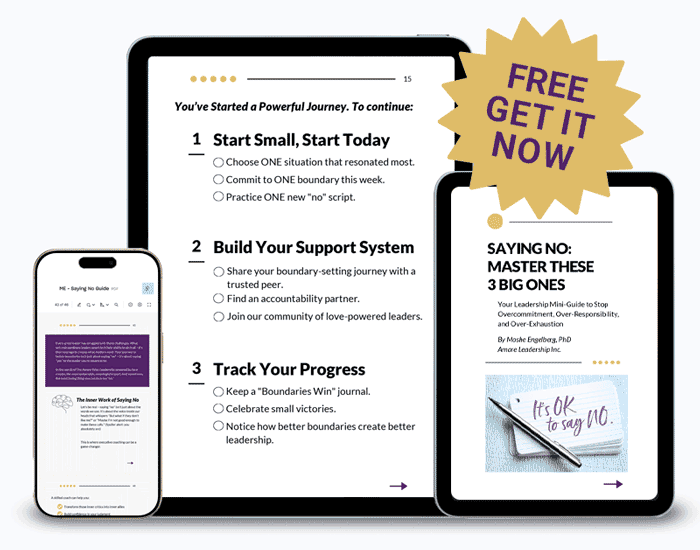At the recent funeral of a soldier named Moshe Noll, the eulogy described his lifetime of extreme learning struggles, and his adamant refusal to be unhappy about it.
He couldn’t read or write when he arrived at religious school as a young adult. Yet he overcame those challenges with quiet determination, and moved through life with joy and humor.
When asked how he managed to stay so positive, Moshe explained simply: “Things are hard enough for me as it is. Do I need to add the challenge of sadness, too?” Moshe actively chose to not suffer.
Suffering is Not Good Leadership
Somewhere along the way, many leaders started treating suffering as an unspoken job responsibility—toughing it out, bearing stress stoically, and wearing exhaustion like a badge of honor.
Over time, this mindset corrodes clarity, disconnects leaders from their teams, and turns resilience into burnout. What begins as dedication often ends in depletion—physically, emotionally, and culturally.
The Wisdom of Not Adding Burdens
Yes, pain is an inevitable part of life and leadership. Suffering is what you add to the pain, if you choose. It’s the extra weight of shame, blame, fear, and the stories you may tell yourself: “This shouldn’t be happening,” “It’s all my fault,” or “If I were stronger, I’d power through.” If you pile suffering on top of real pain, you lose your power and your presence.
Painful Layoffs
Consider a CEO forced to lay off good people. The pain is real. But if he ruminates on being a failure, or numbs out to avoid feeling anything, he adds shame or emotional disconnection. His suffering builds and spreads, clouding his judgment and paralyzing next steps. People sense it; they may even join him on the suffering bandwagon.
Alternatively, if he stays with the truth—layoffs are painful and hard, and he’s doing his best—he can lead with empathy and clarity. Even love. He stays present and fully available to do what is needed next. The pain is enough—he doesn’t make it worse by suffering.
- Where are you (unknowingly or not) adding suffering to real pain?
- What would it look like to respond with joy instead?
- What becomes possible if you lead with love–even when life feels unfair or overwhelming?
Stop Suffering with the “Strong Start” Coaching Program
Consider the “Strong Start” 3-month coaching program as a low-risk, high-value way to grow and flourish as the leader you are called to be. Imagine not suffering any longer. For more information, contact me here.
5 Amare Ways to Lead With Happiness, Not Suffering
1. Check your emotional backpack. Notice what you’re carrying. Is the stress from the situation—or your reaction to it? Self-awareness starts here. Lighten your load!
2. Practice radical acceptance. Accept your challenges without decorating them with extra drama. It’s not denial—it’s clarity.
3. Celebrate emotional honesty. Create space for team members to name what’s hard without shame. That simple act can transform a burden into a shared experience—and build trust.
4. Build a culture that doesn’t reward burnout. Stop treating suffering like a performance metric. Create team norms that honor rest, humor, and honesty.
5. Turn hardship into heroic teamwork. Talk openly with your team about how to face challenges without adding emotional baggage. Model resilience without martyrdom.
Make it Better, Not Worse
While you can’t always control what happens, you can choose how you respond and what you add to it. Sometimes the most powerful thing you can do is not to add suffering on top of real hardship.
Instead, meet adversity with light. Sit with the pain without turning it into a story. It, too, shall pass. That’s love-powered leadership in action.
You’ve got this.
Moshe
Today’s Amare Wave Wednesday Quote
“Pain is what the world does to you; suffering is what you do to yourself.”
— Naval Ravikant, entrepreneur and investor
Click here and read more Amare Wave Wednesday newsletters on related topics:
Stop Ruminating, Start Savoring: A 5-Step Mindful Shift for Leaders
Pain in Leadership is Inevitable. Suffering is Optional.
Stop Being So Mean to Yourself: 5 Amare Leadership Tips for Less Suffering and More Happiness
Pain & Suffering in Business: An Amare Perspective
The Smart Leader’s Team-Building Shortcut? Fun Strategic Retreats
Original article published on Inc.com.


